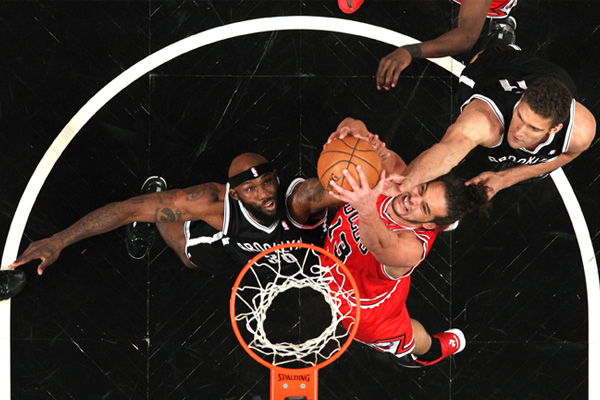
Photo: nuccio dinuzzo/chicago tribune
Chicago Bulls center Joakim Noah (13) with Brooklyn Nets power forward Reggie Evans (30) and Nets center Brook Lopez (11), during game 1 of the playoffs in Brooklyn on Saturday night.
Saturday night’s game in Brooklyn, the Bulls' first in the 2013 NBA playoffs, was a complete nightmare.
The Nets took an early first quarter lead and then piled on, making a ridiculous 16 of its 20 second quarter shots, en route to a 106-89 stomping. Former Illinois star Deron Williams cut apart Chicago’s defense, one of the league’s best, getting easy shots at the rim for himself and center Brook Lopez. Playing through plantar fasciitis, Joakim Noah hobbled around the floor for 14 painful—albeit inspiring—minutes while Derrick Rose, 51 weeks removed from his devastating knee injury, watched solemnly from the end of the bench. Former Bull and Bench Mob castaway C.J. Watson added insult to injury, coming off the Brooklyn pine to score 14 points. (Since the All-Star break, Watson is shooting 51.4 percent from beyond the arc. That's very good.)
During halftime, ESPN’s Michael Wilbon mentioned that he could not remember watching a more miserable half in Bulls playoff history. And he’s seen a lot of postseason games in his hometown.
The good news?
It was just one game, on the road, in what most experts think will be a long, tight series. The Bulls will have to clamp down on the defensive end, no doubt, but they’ve made great teams take difficult shots, game in and game out, for three years running. It’s their thing. And while the Nets have a solid team, particularly with Williams directing traffic in half-court sets, Brooklyn has a few glaring vulnerabilities on the defensive end that the Bulls should be able to exploit.
Let’s start on the interior. The Nets give teams a whole lot of room to score on the block. There’s a reason Carlos Boozer—the man Bulls fans love to hate—has eaten the Nets alive this season, averaging 22 points and 10 rebounds in four games, including 25 and eight on Saturday. On the season, opponents shot nearly 60 percent from within five feet and 41 percent from between five and nine feet against Brooklyn, percentages that placed them near the league’s basement. According to Synergy Sports play-by-play data, they were the 27th most effective team defending on post-up plays and 29th guarding the roll man in pick-and-roll sets. Reggie Evans is particularly brutal down low; on 131 plays in which big men backed him down, the Nets let in 137 points. (For context, sieve Carlos Boozer faced 135 post-up plays and let in just 119 points.)
The key is to work the ball down low and to make baskets. P.J. Carlesimo’s big men play straight up, posting the league’s second lowest defensive free throw rate, and they suck up rebounds if you miss. (Reggie Evans is unusually strong on the defensive glass, but Lopez and Kris Humphires aren't slouches, either.) Still, if Thibs can get Taj Gibson and Boozer quality touches early, points should follow.
The other problem area for Brooklyn is transition defense. The Nets play incredibly slow, and aren’t really adept at guarding teams that get out and run. The Bulls, unfortunately, are one of the league’s least efficient teams (25th) on the break. The main culprit is Nate Robinson; the little man often tries to do too much in the open floor, either with a rash jumper or difficult pass. If Marco Belinelli can find creases to shoot and Jimmy Buttler attacks the rim, on the other hand, good things tend to happen. The emergence of Butler—a dynamite athlete and defensive stopper with a personal story cut from Central Casting—has been the most exciting development in an otherwise grinding Bulls season. Now slotted in as a starter, and shooting at a fiery clip over the past six weeks, it’d be gratifying to see the Marquette product make a meaningful impact in the postseason.
If Noah, warrior that he is, continues to play at half-strength, or Williams keeps playing like vintage Jason Kidd, this series might be a quick one. But the Nets are beatable. Nice as it would be for Rose to rip off his suit and throw on some sneakers, that shouldn't be required to get a few wins.


